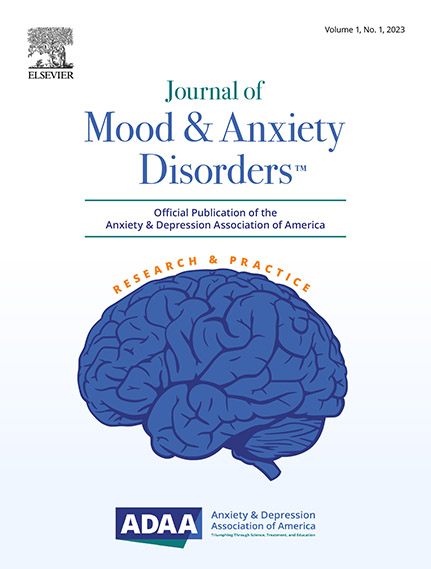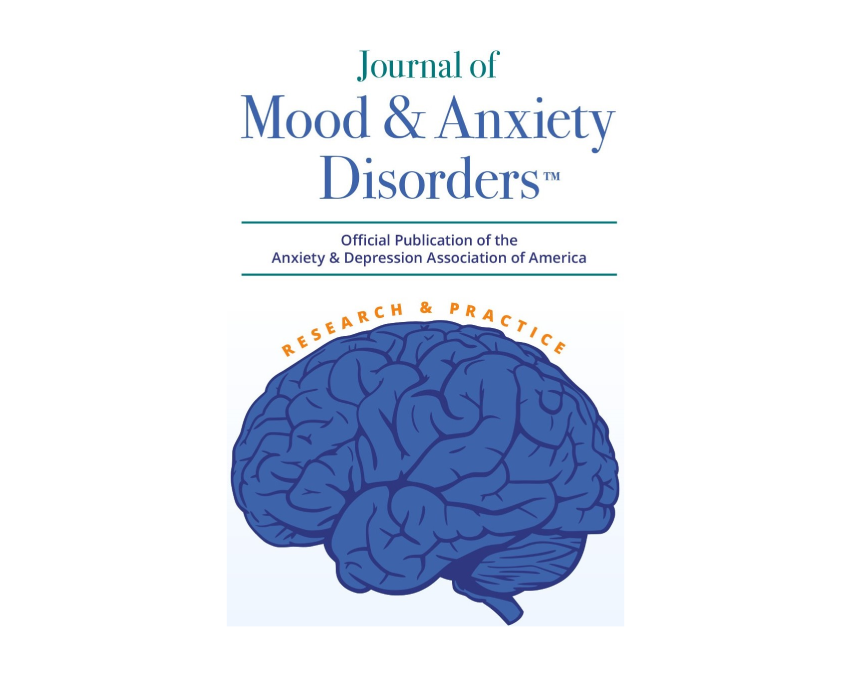
Submit Today!
The APC is $2700 for full-length articles and $1350 for short communication and “case report” types of articles). All accepted articles receive a 25% discount off the APC price for 2025.
Did You Know?
Journal submissions can accommodate videos, graphic abstracts, and lay summaries. Specs for submitting these are included in the journal Guide for Authors (see: Guide for authors - Journal of Mood & Anxiety Disorders - ISSN 2950-0044 | ScienceDirect.com by Elsevier). Please note: as with all content submitted to the journal, they must meet peer-review standards.
The Journal of Mood & Anxiety Disorders.TM is the official Journal of ADAA (published by Elsevier) and welcomes original clinical, translational, and basic research as well as synthetic review articles covering neurobiology (genetics and neuroimaging), epidemiology, experimental psychopathology, pathophysiology and treatment (psychotherapeutic, neuromodulation, and pharmacologic) aspects of mood and anxiety disorders. We encourage original research submissions from basic neuroscientists and pharmacologists as well as all clinical investigators to establish a platform for translational advances and dialogue. To advance this discussion, review papers focusing on current treatment advances as well as those providing innovative and cutting-edge reviews of key areas and issues guiding mood and anxiety disorder science will be prioritized. We encourage submissions from international experts. All submissions will be peer reviewed.
Read the September 2024 Elsevier Society Interview with Journal Editor Dr. Steve Strakowski
Read the 8th Journal Issue - December 2024
Journal News!
- September 17 2024: Strategy of a successful journal launch: ADAA’s community-and-beyond approach, Elsevier Societies
- March 31 2024: As part of an ongoing Call for Papers, Elsevier offers this Q&A discussion with Stephen M. Strakowski, M.D., the Editor-in-Chief of the Journal of Mood & Anxiety Disorders.
- February 2024: The Journal has now been accepted into the Directory of Open Access Journals (DOAJ). This is the first of several indexing sources in which we are expecting the journal to appear. Inclusion in DOAJ demonstrates sustainability and that a high standard has been met. It will also serve to increase visibility in search engines, increase submissions, increase traffic to content, and further extend the Journal’s reach worldwide. Congratulations to Editor-in-Chief Steve Strakowski and to his great editorial team.
- June 14, 2023: When Finding Your Bliss Means Floating Naked in a Tank of Water, Wall Street Journal. Journal article referenced: Reduced Environmental Stimulation Therapy (REST) in anxiety and depression: An experience sampling study. ADAA members Sahib Khalsa MD PhD, Martin P. Paulus MD, MPH, and Murray Stein, MD are contributing authors of the study,
Meet the Journal Editor-in-Chief
 Stephen M. Strakowski, MD
Stephen M. Strakowski, MD
Stephen M. Strakowski, MD, is the Professor and Vice Chair, Research of Psychiatry at Indiana University School of Medicine (IUSM). He also serves as Professor of Psychiatry and Associate Vice President, Regional Mental Health at the Dell Medical School, University of Texas in Austin. Previously he served as Vice Dean for Research at Dell Medical School and the University of Cincinnati; at the latter, he also served as Senior Vice President of Strategy. He is the Treasurer for the National Network of Depression Centers, and Director of Strategy for the American Brain Coalition. Dr. Strakowski graduated summa cum laude from the University of Notre Dame with a BSE in 1984 and alpha omega alpha from Vanderbilt University School of Medicine with an MD in 1988. He completed his residency training at McLean Hospital/Harvard University School of Medicine in 1992. Upon completing residency, he moved to the University of Cincinnati where he remained for 24 years until moving to the University of Texas, and more recently IUSM. Dr. Strakowski is an internationally recognized and trusted expert in the study and treatment of bipolar and other mood disorders. His research group has been a world leader studying the treatment, outcomes and neurobiology of these conditions. He also leads work to improve racial equity in psychiatry and the delivery of mental health services. He is recognized as a Best Doctor® and by US News and World Report® as a Top 1% Psychiatrist. He maintains an active clinical practice and research career.
“I am honored to be named the founding Editor-in-Chief of the new ADAA Journal of Mood and Anxiety DisordersTM. With the support of our wonderful organization, and the expertise, passion and compassion of our members, I believe we are ideally positioned to create and build a journal that will have impact not only in publications but in the lives of the people we serve. I am very much looking forward to working together as a team to achieve this vision. We will strive to develop content that clinicians find useful in their practices today, provide a forum for presenting future treatment options as they occur, deliver cutting edge research and inspire a next generation of investigators.”
- Read this September 17 2024 Elsevier Article: Strategy of a successful journal launch: ADAA’s community-and-beyond approach.
Read this March 2024 Elsevier Q&A discussion with Stephen M. Strakowski, M.D., the Editor-in-Chief of the Journal of Mood & Anxiety Disorders.
Meet the Journal Associate Editors

Olusola Alade Ajilore, MD, PhD
Dr. Ajilore is the Center for Depression and Resilience Professor in the Department of Psychiatry at the University of Illinois-Chicago. He graduated magna cum laude from Harvard University with a degree in biology. Dr. Ajilore did his MD/PhD degree at Stanford University where he studied the negative effects of stress hormones on the brain. He joined the research track residency at UCLA where he transitioned into neuroimaging in major depression. His lab currently uses computational neuroimaging techniques and digital biomarkers to better track and treat neuropsychiatric disorders. Dr. Ajilore also serves as the Associate Head for Faculty Development and the director the Mood and Anxiety Disorders Program.
"The Journal is an important venue to highlight innovation and impact for the understanding, treatment, and prevention of mood and anxiety disorders. I hope that the Journal will serve as a credible and reliable source of information for mental health professionals, academics, and the general public, contributing to the advancement of knowledge in the field of mental health."
Erika Wolf, PhD
Dr. Wolf is a Clinical Research Psychologist at the Behavioral Science Division of the National Center for PTSD at VA Boston Healthcare System and a Professor of Psychiatry at Boston University Chobanian & Avedisian School of Medicine. Dr. Wolf’s research focuses on the use of multivariate data analytic techniques, such as confirmatory factor analysis, structural equation modeling, latent class analysis, and item response theory, to measure trauma, posttraumatic stress disorder (PTSD), and related comorbidity. Her work has focused on the idea that PTSD is associated with accelerated cellular aging, as reflected in DNA methylation and as manifested in physical health and neurocognitive decline. This work involves the study of multiple types of biomarkers, ranging from epi/genetics to metabolites expressed in blood and/or brain tissue, to neural structure and function.
The Journal will advance the scientific study of mood and anxiety disorders by providing an outlet to share rigorous new research and critical reviews of these common and often debilitating conditions. The journal’s breadth of coverage, ranging from basic to clinical research, will be appealing and informative for a multidisciplinary readership. I am eager to see the launch of this new journal and to contribute to its growth.
Meet the Journal Editorial Board
Submission Portal
Watch the ADAA Webinar - Tips for Publishing Your Journal - with ADAA's Journal Editor-in-Chief
Did You Know?
Journal submissions can accommodate videos, graphic abstracts, and lay summaries. Specs for submitting these are included in the journal Guide for Authors (see: Guide for authors - Journal of Mood & Anxiety Disorders - ISSN 2950-0044 | ScienceDirect.com by Elsevier). Please note: as with all content submitted to the journal, they must meet peer-review standards.
The content of this publication is subject to copyright. ADAA reserves all rights, express or implied, with respect to it. Copying, reproducing, duplication, alteration or otherwise or of any portion hereof, published in electronic or paper format or form, including using it with artificial intelligence models/databases, is strictly prohibited without the express, prior and written permission of ADAA.
Please note:
The former Depression and Anxiety journal is no longer affiliated with ADAA and is independently being managed by Wiley/Hindawi without the administrative input, editorial guidance, and/or scientific guidance of ADAA. If you have questions about submissions to the former Depression and Anxiety Journal, please contact [email protected] or [email protected].








